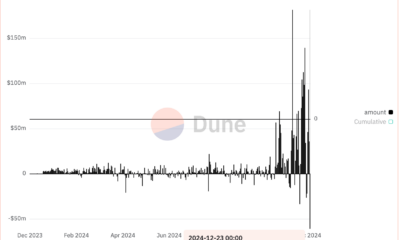crypto custody
Centralizing SaaS wallets: Killing autonomy for the sake of convenience?
Published
4 months agoon
By
admin
Disclosure: The views and opinions expressed here belong solely to the author and do not represent the views and opinions of crypto.news’ editorial.
Traditional software-as-a-service-based multi-party computation custodians are often seen as the “convenient” solution in the crypto universe, managing a staggering portion of decentralized assets. But the reality is that the convenience quickly wears off, revealing a host of limitations, unexpected risks, and challenges as you dive deeper into the technological aspects of protecting digital currency.
Regardless of your decentralization versus centralization stance, it is essential to recognize that the appearance of private key control can be skewered by a lack of control in policy governance and infrastructure you do not run yourself.
The rise and risks of SaaS-based MPC wallets
The emergence of SaaS-based MPC wallets has significantly impacted the crypto landscape, allowing businesses to manage digital assets with convenience and perceived security. These wallets are typically provided by tech companies that are currently positioning themselves more and more as non-custodial service providers. However, despite this label, these solutions still require users to trust a centralized party to coordinate signing and key generation securely, placing them high on the custody spectrum in terms of control over assets.
This reliance on a centralized service provider creates a situation where control and security are not entirely in the hands of the institution using the service. While these tech providers do not operate as traditional third-party custodians, such as BitGo or Anchorage—highly regulated and offer fully managed custodial services—they still introduce a central point of control and potential vulnerability. As used by both SaaS-based providers and traditional custodians, MPC technology involves splitting cryptographic keys required for transactions into multiple parts distributed among various parties to enhance security.
However, in the case of SaaS-based solutions, the centralization of these services within a few dominant players introduces new risks. One of them is that these providers become attractive targets for hackers due to their significant control over many clients’ assets, creating a vulnerability similar to that of centralized exchanges. Two, the concentration of control in these SaaS-based models not only increases security risks but indirectly limits the autonomy of crypto businesses.
By relying on an external provider to manage critical aspects of digital asset security, institutions may find themselves constrained in managing policies, procedures, and the overall governance of their assets. This centralization stands in contrast to the decentralized ethos of the crypto industry, where individual sovereignty over digital assets is paramount.
The challenges of dependency and trust in MPC custodians
While MPC wallets often claim to be non-custodial because the institution holds part of the key, the reality is far more complex: the heavy dependency on third-party vendors for day-to-day operations, security, and service availability introduces significant risks. Despite the customer institution holding a key share, all other components affecting the use or potential misuse of key shares remain under the vendor’s control. This setup creates vulnerabilities around key signing integrity but, even more importantly, introduces friction into the customer experience, an operational risk that should be accounted for. For instance, any policy change can take up to a few weeks if it is not prioritized by the vendor, posing significant delays and operational inefficiencies.
Analyze this potential impact further. MPC wallets can have longer transaction times, and their reliance on vendors for routine account changes and maintenance can be problematic. If a team member leaves, revoking their access is done at the vendor’s tempo. It can take considerable time, resulting in a period where the security of assets may be compromised. Additionally, service downtimes for maintenance during business hours can disrupt operations. Plus, in disaster scenarios, asset recovery can take up to 48 hours—a period that is far too long for any organization dealing with high-value transactions. These operational dependencies can be highly inconvenient. Ultimately, they pose security risks that contradict what decentralization stands for—namely, running your own wallet infrastructure.
For regulated financial institutions or firms with stringent security requirements, these dependencies are deal-breakers. That’s because the operational risks and costs associated with relying on third-party MPC wallet solutions are often unacceptable to internal risk teams. These teams are unable to get comfortable with the inherent uncertainties and potential for delayed response times that these products entail. Consequently, many MPC wallet solutions fail to pass the rigorous scrutiny of risk assessments, preventing them from being adopted by institutions that require the highest levels of security and operational control.
A new paradigm for crypto custody
If the incumbent SaaS solutions represent the ‘trust us’ model, the ideal solution should transition towards a ‘trust but verify’ approach and, ultimately, a ‘never trust, always verify’ model. This shift empowers customers to partially or fully host the software, granting them control and ownership of critical IT infrastructure. By eliminating the opaque operations inherent in black box SaaS solutions, institutions not only mitigate operational risks hidden in the friction of operating in a third party’s sandbox but also enable more agile and flexible infrastructure management.
This enhanced control supports better risk management and allows institutions to adapt quickly to market demands, ultimately driving revenue growth and positively impacting the bottom line.
A practical solution integrates critical management and policy controls into a comprehensive platform, allowing institutions to manage their digital assets within a zero-trust security framework. This architecture continuously validates every interaction, eliminating implicit trust and enhancing security. By adopting a service-oriented architecture, institutions can tailor the system to their unique requirements, ensuring scalability, high performance, and robust security.
Current market offerings, which rely entirely on SaaS-based MPC wallets, place undue trust in vendors who control all components, including cryptographic processes, keys, policies, and transaction data. By moving towards solutions that enable institutions to own and control critical parts of their digital asset infrastructure, the industry can mitigate risks and reduce vulnerabilities while operating more closely to the principles of decentralization. Such a transformation is essential for fostering trust and security in the rapidly evolving crypto landscape.
Now is the time for institutions to take control of their policies. By adopting models that provide partial or complete control over key management and policy enforcement, institutions can better align with the correct treatment and oversight of service providers or outsourcing arrangements. This paradigm shift is essential for the industry’s future, and it’s something that is poised to safeguard crypto’s core values while paving the way for continued innovation and trust.

Haden Patrick
Haden Patrick is the director of business operations of Cordial Systems, a provider of institutional-grade self-custody software using a zero-trust security model. Haden has executive experience in team leadership, engineering, and education originating from his 24-year career as a Naval Officer. After co-founding SoloKeys, the first open-source security key company, he managed projects connecting web3 to traditional finance at a cryptocurrency trading firm before joining Cordial Systems.
Source link
You may like


BTC Risks Falling To $20K If This Happens


Most Layer 2 solutions are still struggling with scalability


Here’s why Stellar Price Could Go Parabolic Soon


Perp-Focused HyperLiquid Experiences Record $60M in USDC Net Outflows


Experts say these 3 altcoins will rally 3,000% soon, and XRP isn’t one of them


Robert Kiyosaki Hints At Economic Depression Ahead, What It Means For BTC?
Adoption
Algoz taps Wincent to streamline its fiat-to-crypto onboarding process
Published
2 months agoon
October 30, 2024By
admin

Digital asset investment firm Algoz has announced a strategic collaboration with regulated market maker and top over-the-counter desk Wincent.
Algoz shared details of the new partnership via a press release sent to crypto.news on Oct. 30. This announcement follows Algoz’s recent collaboration with Standard Chartered-backed Zodia Custody.
According to the announcement, Algoz will leverage its partnership with Wincent to facilitate the onboarding of new investors. Through this collaboration, investors such as family offices seeking to enter the crypto market via Algoz will not need to convert fiat currencies to crypto beforehand, as is typical across many providers in the industry.
Wincent offers the solution to this hurdle. Algoz users can now invest using Tether (USDT) Bitcoin (BTC) and Ethereum (ETH) and other cryptocurrencies using U.S. dollars, euros, or other fiat currencies. The partnership allows Algoz clients to directly swap fiat for crypto, reducing risks associated with exposure to unregulated providers.
Algoz noted that its collaboration with Wincent supports asset conversion based on already approved know-your-customer and anti-money laundering checks. These regulatory requirements are critical components of global crypto regulation, with various industry players viewing them as essential to the growth of the crypto market.
With regulatory clarity pivotal to the industry, many players are implementing measures to ensure safe on- and off-ramping of customers. Regulated platforms like Wincent and institutional-backed providers like Zodia Custody contribute to this approach.
The platform’s off-exchange settlement solution, Quant Pro, plays a central role in the partnership.
For Algoz, the solution, Zodia’s custody wallet, and Wincent’s know-your-customer and anti-money laundering integration add a layer of protection for users.
“The creation of Quant Pro, our off-exchange settlement system, using Zodia was the first breakthrough for investors as we were able to significantly mitigate exchange and management counterparty risk.”
Stephen Wundke, director of strategy and revenue at Algoz.
Wincent’s regulated market records between $3 and $5 billion in daily volume, with over 300,000 daily transactions.
Source link
crypto custody
WazirX seeks new custodian partner with insurance for funds
Published
2 months agoon
October 25, 2024By
admin

Crypto exchange WazirX is searching for a new custodian that can offer insurance for user funds, aiming to enhance security and minimize risk.
Indian cryptocurrency exchange WazirX is actively seeking a new custodian partner that can provide insurance for user funds, aiming to bolster security as it works to restructure operations following a major cyberattack in July.
📢 Proof of Reserves is now live
In line with our commitment to transparency, you can now verify wallet addresses and review asset balances through our Proof of Reserves.
Click here 👉 https://t.co/Aivwy4nYCP
Note: A Proof of Reserves dashboard with dynamically updated data… pic.twitter.com/0yrg9zvrQT
— WazirX: India Ka Bitcoin Exchange (@WazirXIndia) October 25, 2024
In a blog post on Oct. 24, the exchange said it is trying to find a “custody provider who can offer insurance for the funds so that loss is minimized, even in worst-case scenarios.”
“While security is paramount, in this dynamic and new world of crypto, insurance will start playing an even more important role in custody services.”
WazirX
Additionally, WazirX launched a dual proof-of-reserves dashboard, developed in collaboration with CoinGabbar, a research marketplace, enabling users to independently verify wallet addresses and asset balances.
The platform’s efforts to rebuild trust come in the wake of a $235 million cyberattack in July, which prompted WazirX to collaborate with government agencies, including the Financial Intelligence Unit, to investigate the incident. As crypto.news reported earlier, the exchange has been cooperating with authorities, providing transaction trails and server logs to aid the investigation.
WazirX’s parent company, Zettai, has also engaged in discussions with potential partners to enhance user recoveries, exploring options like capital injections and profit-sharing arrangements. WazirX aims to return 52-55% of remaining crypto assets to clients within six months as part of its restructuring efforts, guided by a 10-member committee of creditors.
Source link
Bitcoin
Pennsylvania passes bill allowing Bitcoin payments, crypto self-custody
Published
2 months agoon
October 24, 2024By
admin

The Pennsylvania House of Representatives has passed a bill that could impact how digital assets are used within the state.
House Bill 2481, also known as the Bitcoin Rights Bill, was approved with a bipartisan majority of 176 votes to 26, and now heads to the state Senate for further consideration, according to Fox Business.
The bill, introduced by the nonprofit Satoshi Action Fund, establishes legal clarity around cryptocurrency ownership and usage. It allows residents to self-custody their digital assets, meaning they can hold Bitcoin (BTC) and other cryptocurrencies directly without relying on third-party services like exchanges.
Improved Bitcoin use
The bill also permits the use of Bitcoin for payments, which could change the way businesses and individuals conduct transactions using the cryptocurrency.
For those unfamiliar with crypto, self-custody means owning your digital currency directly, giving you full control over your assets. When you use exchanges, you trust them to store and manage your assets, but self-custody puts that responsibility in the hands of the individual.
Bitcoin is a digital currency that operates without a central authority, and this bill would make its use more widely accepted in Pennsylvania.
If passed by the Senate, this legislation could signal a growing acceptance of digital currencies at the state level, while the federal government continues to grapple with crypto regulation.
Pennsylvania’s decision mirrors efforts in other states, such as Oklahoma and Louisiana, which have passed similar laws.
Source link

BTC Risks Falling To $20K If This Happens

Most Layer 2 solutions are still struggling with scalability

Here’s why Stellar Price Could Go Parabolic Soon

Perp-Focused HyperLiquid Experiences Record $60M in USDC Net Outflows

Experts say these 3 altcoins will rally 3,000% soon, and XRP isn’t one of them

Robert Kiyosaki Hints At Economic Depression Ahead, What It Means For BTC?

BNB Steadies Above Support: Will Bullish Momentum Return?

Metaplanet makes largest Bitcoin bet, acquires nearly 620 BTC

Tron’s Justin Sun Offloads 50% ETH Holdings, Ethereum Price Crash Imminent?

Investors bet on this $0.0013 token destined to leave Cardano and Shiba Inu behind

End of Altcoin Season? Glassnode Co-Founders Warn Alts in Danger of Lagging Behind After Last Week’s Correction

Can Pi Network Price Triple Before 2024 Ends?

XRP’s $5, $10 goals are trending, but this altcoin with 7,400% potential takes the spotlight

CryptoQuant Hails Binance Reserve Amid High Leverage Trading

Trump Picks Bo Hines to Lead Presidential Crypto Council
182267361726451435

Why Did Trump Change His Mind on Bitcoin?

Top Crypto News Headlines of The Week

New U.S. president must bring clarity to crypto regulation, analyst says

Will XRP Price Defend $0.5 Support If SEC Decides to Appeal?

Bitcoin Open-Source Development Takes The Stage In Nashville

Ethereum, Solana touch key levels as Bitcoin spikes

Bitcoin 20% Surge In 3 Weeks Teases Record-Breaking Potential

Ethereum Crash A Buying Opportunity? This Whale Thinks So

Shiba Inu Price Slips 4% as 3500% Burn Rate Surge Fails to Halt Correction

Washington financial watchdog warns of scam involving fake crypto ‘professors’

‘Hamster Kombat’ Airdrop Delayed as Pre-Market Trading for Telegram Game Expands

Citigroup Executive Steps Down To Explore Crypto
Mostbet Güvenilir Mi – Casino Bonus 2024

NoOnes Bitcoin Philosophy: Everyone Eats
Trending

 3 months ago
3 months ago182267361726451435

 Donald Trump5 months ago
Donald Trump5 months agoWhy Did Trump Change His Mind on Bitcoin?

 24/7 Cryptocurrency News4 months ago
24/7 Cryptocurrency News4 months agoTop Crypto News Headlines of The Week

 News4 months ago
News4 months agoNew U.S. president must bring clarity to crypto regulation, analyst says

 Price analysis4 months ago
Price analysis4 months agoWill XRP Price Defend $0.5 Support If SEC Decides to Appeal?

 Opinion5 months ago
Opinion5 months agoBitcoin Open-Source Development Takes The Stage In Nashville

 Bitcoin5 months ago
Bitcoin5 months agoEthereum, Solana touch key levels as Bitcoin spikes

 Bitcoin5 months ago
Bitcoin5 months agoBitcoin 20% Surge In 3 Weeks Teases Record-Breaking Potential


